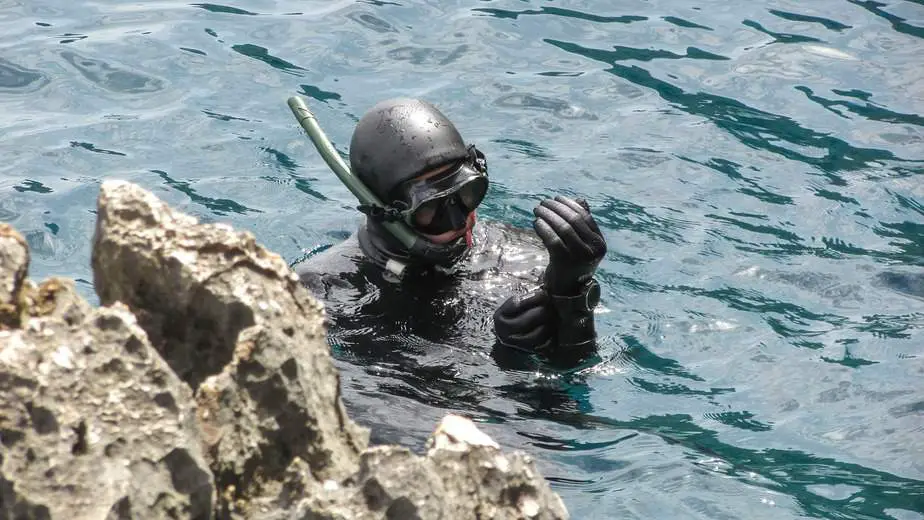Many people say snorkeling is easy. Even on paper, snorkeling seems pretty straightforward. You just need a mask, snorkel, fins, and you can start snorkeling, right? Not necessarily. All of this is assuming that you already are comfortable with swimming. If a non-swimmer wants to try snorkeling, it may not be as easy or safe as people often describe this activity. It might even feel scary.
Snorkeling is as easy or difficult, safe or dangerous in direct proportion to how experienced and confident the snorkeler is with swimming. If you are not good at swimming, then you are at greater risk of accidents than someone who is a proficient swimmer. It’s true that most snorkelers wear some kind of buoyancy aid to conserve energy, but advanced snorkelers will want to duck dive to get a better view of the world beneath the water’s surface. Furthermore, a strong swimmer will learn how to snorkel much faster than someone who is a non-swimmer.
With that said, don’t be discouraged if you’re currently not a strong swimmer. In this article, we’ll take you through step-by-step how you can improve your swimming and snorkeling skills in a safe and doable manner. Even if snorkeling is hard for you right now, with enough practice, it will quickly become easy. Then, you can enjoy the aquatic world with no more worries.
Is it hard to snorkel?
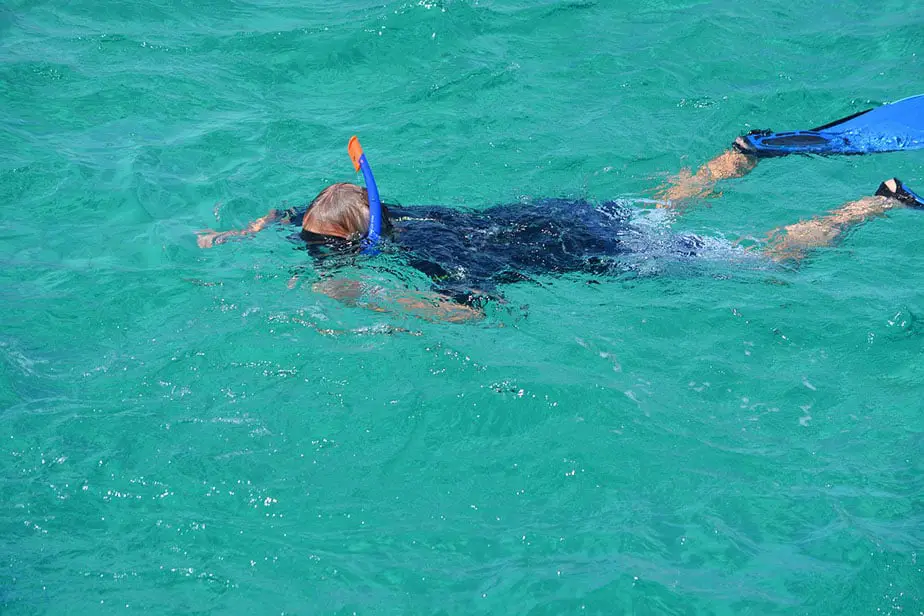
Snorkeling is often touted as an inexpensive, safe, and easy way to go sightseeing in the ocean without needing to learn how to scuba dive. On the surface, snorkeling seems to live up to the hype. The concept is so simple, too. Just breathe through a tube while underwater just like our ancestors have done for hundreds of years. What could be simpler than this?
This is all predicated on the assumption that you had a lot of experience swimming when you were younger. Imagine attempting to snorkel if you literally don’t know how to swim or if you have a strong phobia of water. Suddenly, this “easy” hobby seems insurmountable.
Furthermore, some first time snorkelers had an awful experience because they kept swallowing water that somehow made its way into the tube. They may also have had issues with mask leaks or the mask fogging up.
These issues are relatively easy to fix in the grand scheme of things, but they can lead to a frustrating first time experience that may turn off people from snorkeling ever again.
On top of that, sometimes drownings can occur in shallow water when someone chokes on water, panics, fails around and can’t seem to lift their head out of the water to breathe fresh air. If the wind is blowing too hard and water sprays into the snorkel, it can cause a panic if the snorkeler is unprepared.
We feel that the right way to start snorkeling is to be a proficient swimmer. Knowing that you are competent in the water will give you the confidence that other first time snorkelers might not have. It will help you stay calm and avoid tragedies like what we just described above.
The next step is to find the right gear. The mask leaking and fogging have to do with the mask not being treated properly or not sealing properly on the face. The issue with water entering the tube often means your snorkel doesn’t have a splash guard.
So long as you are being cautious and using properly fitting gear in water that is calm and warm, then snorkeling truly will be easy and idyllic as it is often described. Let’s break down how you can reach this stage in steps.
Does snorkeling require training?
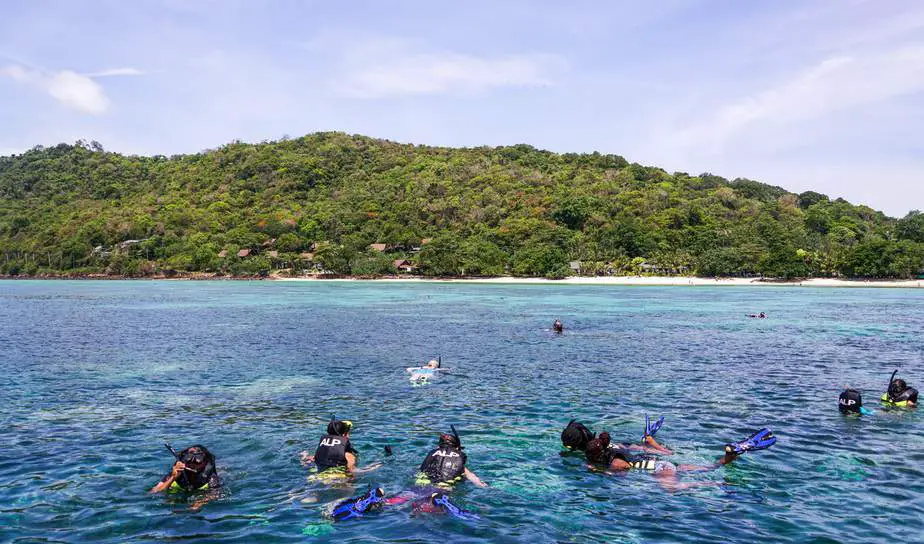
Not necessarily. If you are completely new to swimming in general, let alone snorkeling, then you may want to take some swimming lessons. As for snorkeling, a snorkel instructor or guide can give you the basics in a few minutes.
Some important techniques to know are how to clear water from your mask, how to clear the snorkel, and how to conserve energy while snorkeling. Many of these tips seem obvious, however they can be quickly forgotten in the middle of a snorkeling session, especially if it’s your first time snorkeling.
A guide can also alert you to any local hazards, or even local landmarks or marine creatures to see underwater. You don’t need training so much as you need some helpful local advice in order to enjoy snorkeling.
How long does it take to learn how to snorkel?
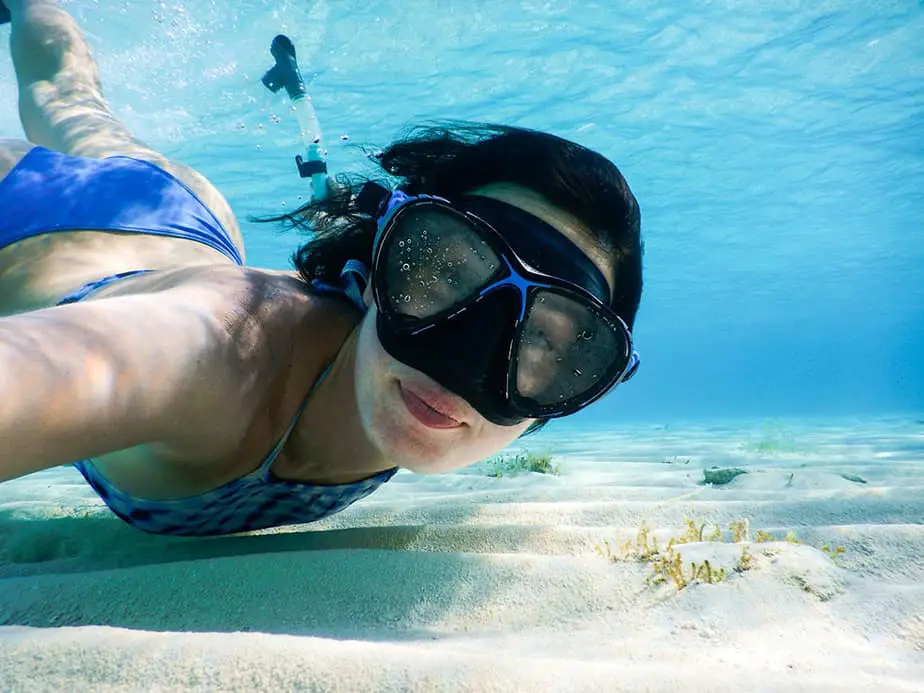
Assuming you already know how to swim, then most people learn how to snorkel almost immediately after they’ve been taught the basics. Compared to scuba diving which actually requires taking a course and getting a certification, snorkeling does not require a certification.
A better question might be: if I’m a non-swimmer, how long does it take to learn how to snorkel? This all depends on the individual. We highly recommend taking swimming lessons, whether it’s in a group or private lessons. This will affect how quickly you learn how to swim. Hopefully you don’t have a fear of water, because that can complicate things.
The primary things you’ll be doing when snorkeling is floating and kicking your legs to propel yourself. Like scuba divers, snorkelers don’t need to use their arms, they only need to kick their legs with the help of fins.
Advanced snorkelers will duck dive to get a better view of interesting things they saw while floating along the water’s surface. This is also known as skin diving, and it’s beyond the scope of this article. If you’re new, we recommend just snorkeling along the surface.
First time snorkelers must also condition themselves to breathe with their mouth, and also to stop trying to breathe with their nose. Snorkel masks seal around the eyes and nose, meaning the nose does not have access to the fresh air the snorkel provides. Unless you’re wearing a full-face snorkel mask over a standard one, you need to get used to breathing with your mouth. How long it takes to get into this habit also depends on the individual.
Optimal conditions for beginner snorkeling
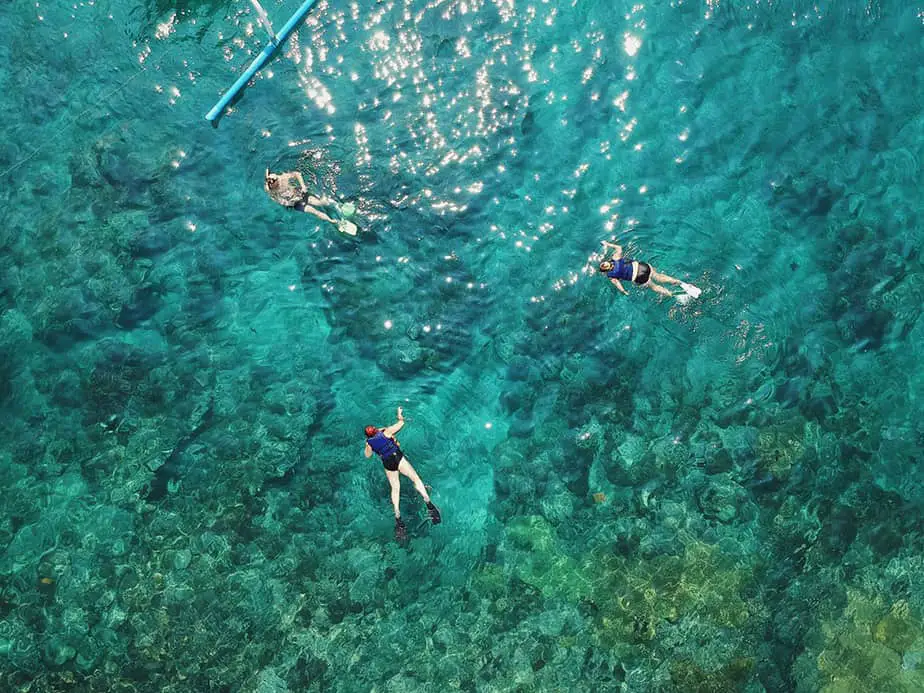
If you’re not a good swimmer, then the safest and most reassuring place to start is in a shallow pool where your head can stick out of the water when you stand up. That way, if you choke on water and panic, you can just stand right up and get a breath of fresh air.
While it’s not particularly interesting to snorkel in a swimming pool, it is a great opportunity to try out your gear for the first time. You can figure out if there are any leaks, if your mask fogs up, or if you are able to breathe with the snorkel properly.
You can test out useful techniques like mask clearing which is how snorkelers and divers can get water and fog out of their mask. Snorkel clearing is also important to clear any water out of it. In a pool, you can also practice your kicks and train yourself not to use your arms.
Depending on your location, you may be able to practice in a lagoon instead of a swimming pool. Lagoons are a naturally sheltered body of water so you don’t have to worry about the waves picking up. There’s more interesting things to see in a lagoon than a swimming pool; just make sure you find one that’s shallow enough for you to stand up in.
When practicing in the open water, keep an eye out for any sensitive sea life beneath you. Many injuries and damage to corals is done by divers who accidentally kicked them with their fins.
Many dive resorts will have dedicated snorkeling areas where there are lifeguards on duty. These designated areas will also have surface ropes or other safety equipment for you to grab onto so you can snorkel safely.
Staying afloat while snorkeling
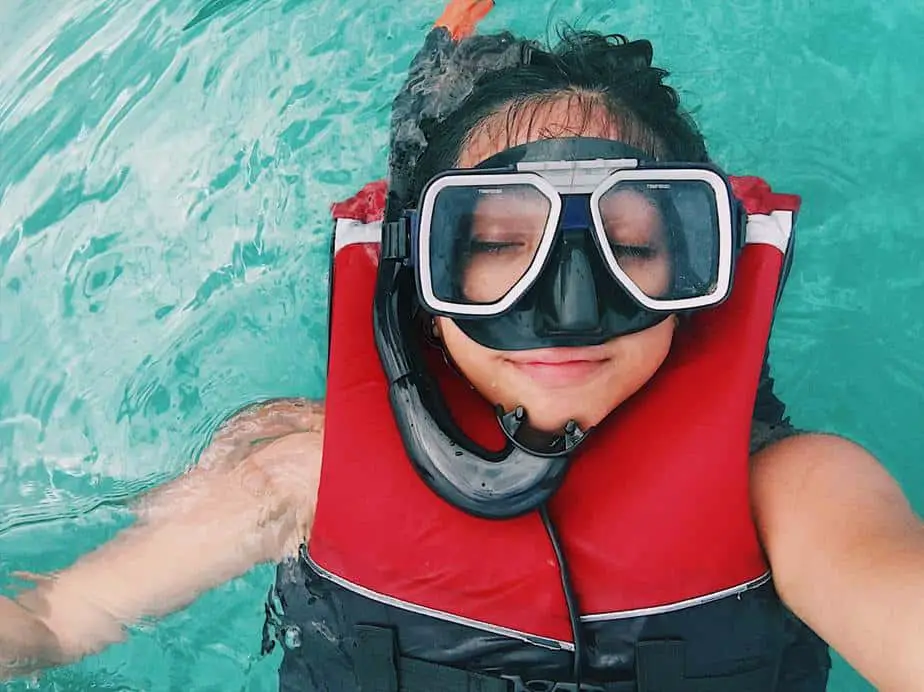
If you’re wondering whether snorkeling requires a lot of stamina to stay afloat, the answer is not really. Most snorkelers will use a buoyancy aid such as a snorkel vest, flotation belt, wetsuit, or even a life jacket. All of these will help you stay afloat so you can focus your energy on observing the underwater world.
Relying on a buoyancy aid is not something to be ashamed of. It is not a sign that someone is a weak swimmer or is unconfident of their swimming skills. A flotation device can not only save you, but it can also help you enjoy snorkeling to the fullest. Why cut your snorkeling time short by exhausting yourself staying afloat when you can just put on a snorkel vest and float as long as you want?
Staying afloat is even easier in saltwater compared to freshwater because the saltwater is denser which requires less effort to float. Saltwater is also generally warmer, so you don’t necessarily need to wear a wetsuit to snorkel in it even for long periods of time.
Can anyone snorkel?
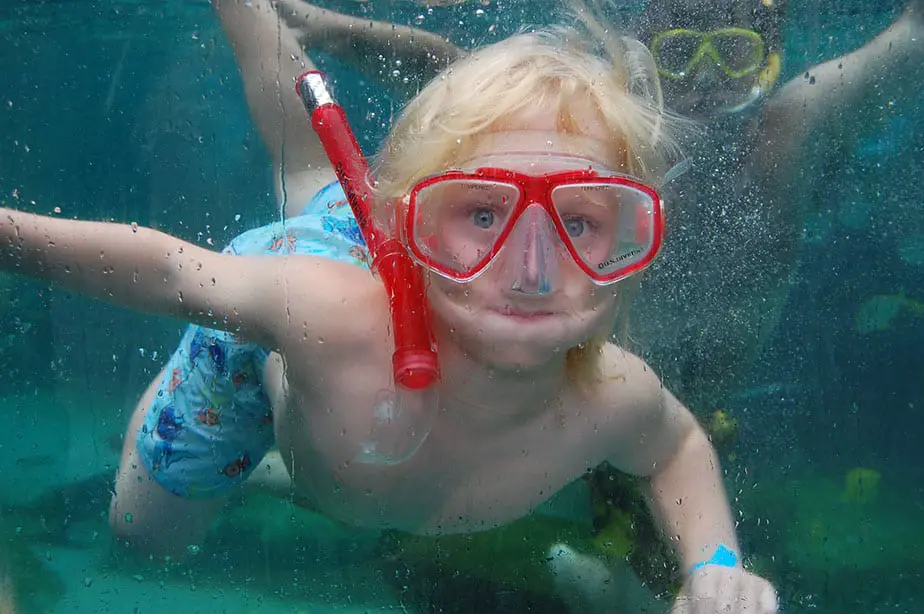
Unlike scuba diving which has minimum age requirements in order to get certified, snorkeling has no such minimum age requirement. There’s no upper age for snorkeling either. In other words, it’s up to you to decide if your kids are old enough to swim or if you’re still capable of swimming yourself.
If children are snorkeling, they should be kept under constant supervision. They should also be wearing some kind of flotation device. We’ll use the minimum scuba diving age requirements and say that kids should be at least 8 years old to snorkel.
With that said, age is not as much of a concern as ability to swim. If your kids are part fish, then perhaps they can start at an even earlier age. The same is also true of adults. Even if you’re getting along in your years, as long as you know how to swim and are being cautious, there’s no reason why older individuals can’t snorkel.
Some special considerations need to be made for children’s equipment. Remember that they are constantly growing, which can make buying a mask and snorkel tricky. You may have to purchase multiple masks over the years as they grow.
In order for a mask to seal tightly against the face, it must fit the facial shape of the wearer, whether that is small and narrow or large and wide.
When your kids hit puberty and they start growing facial hair, that can also affect the mask’s seal. Facial hair either needs to be shaved off, or some other measure needs to be done to strengthen the mask seal. You can try out these masks if you have facial hair, however they can be hit or miss.
Children have smaller lungs which can make breathing through a snorkel difficult. They need to have the lung capacity to fully inhale and also blow hard enough to clear the water from the mask or snorkel. For this reason, it is why we recommend waiting until 8 years of age before starting.
Adults, particularly those with medical conditions, will have to consult with their doctor if they are still able to snorkel. It’s up to you to figure out if you still have the swimming skill and physical fitness to snorkel.
It’s important that older snorkelers don’t push themselves too hard. If they suffer a medical emergency while out in the water, it can be fatal. Stay in shallow waters and snorkel with a buddy just to be safe.
How fit do you have to be to snorkel?
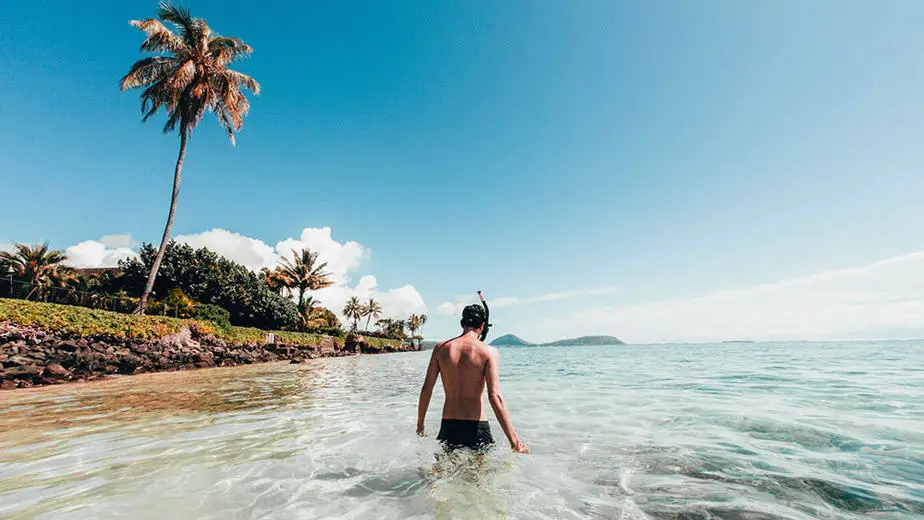
Being physically fit, like knowing how to swim, is highly recommended. Even though snorkeling is meant to be a relaxing activity where you basically float around, you never know when a sudden current might pull you away.
Since snorkeling does not require a certification, there won’t be anyone asking you to complete a medical form or anything strict like that. Despite the non-existent health screening requirements for snorkeling, if you know of a medical condition that you may have, you need to go to the doctor to get it checked out before attempting to snorkel.
Since snorkelers typically wear a flotation device, they technically don’t need to be fit or know how to swim at all. The reason why it’s just a benefit is so that you can handle possible tough situations more reliably.
Being fit and knowing how to swim also opens up more options for you. You can decide to take part in a professionally led excursion, you can duck dive, and you can explore more of the reef compared to someone who lacks these attributes.
If you’re not that fit, we recommend sticking to shallow, calm waters without waves or currents that could pose a threat. Snorkel with a buddy as well in case something goes wrong. See a doctor if you have any medical concerns at all.
Are there snorkeling certifications?
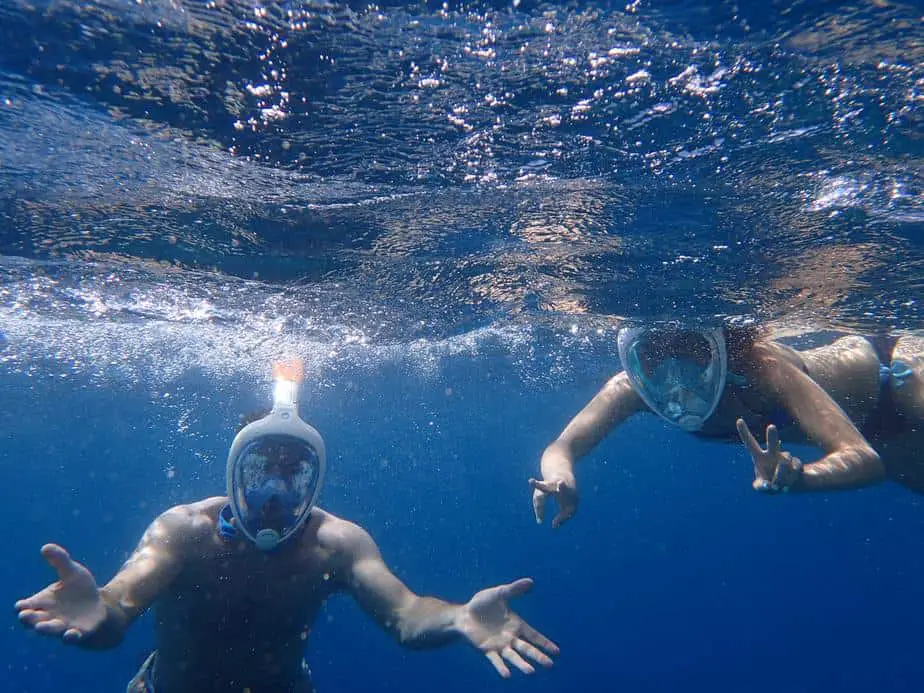
Yes, there are formal snorkeling courses offered by various scuba diving training agencies. In addition to general snorkeling training, they will also teach you how to duck dive safely. If you have any experience with scuba diving, then you’ll already recognize these agencies:
- SSI offers their Snorkel Diver course.
- PADI offers their Skin Diver course.
- NAUI offers their Snorkeler course.
You can trust PADI, NAUI, and SSI to provide a similar, high-quality training experience. A qualified instructor will guide you through practicing basic skills like mask and snorkel clearing, how to perform proper kicks, how to use a snorkel vest, and much more. At the end of the course, you will know how to handle any tough situations you might come up against while snorkeling.
With that said, snorkeling certifications are not a requirement for snorkeling, unlike scuba diving. You can easily go into a dive shop, purchase all of your snorkeling gear and head into the water with no certification necessary.
In fact, if you don’t want to spend money taking a professional course and getting certified, perhaps you can ask a friend with snorkeling experience to teach you the basics. Of course, the quality of instruction you receive from a friend can vary greatly, and if you’re a complete beginner, then perhaps getting professional help would be better.
If you really want to throw yourself into the deep end, you could sign up for an organized snorkeling excursion. Make sure you let the guide know that you’re inexperienced so they can keep an eye out for you and give you some advice.
Whether you take a formal snorkeling course or not, it’s up to you to decide which you prefer. Snorkeling is not so dangerous a sport that you need to be certified, but the option is there.
How snorkeling is done
Perhaps the best way to determine whether snorkeling is easy or difficult is to give you a run-down of what it’s like to get started with snorkeling. In this section, we’ll provide some tips on how you can get properly fitting gear, how to practice snorkeling in a safe environment, and how you can progress to open water snorkeling.
Find a mask and snorkel that fits
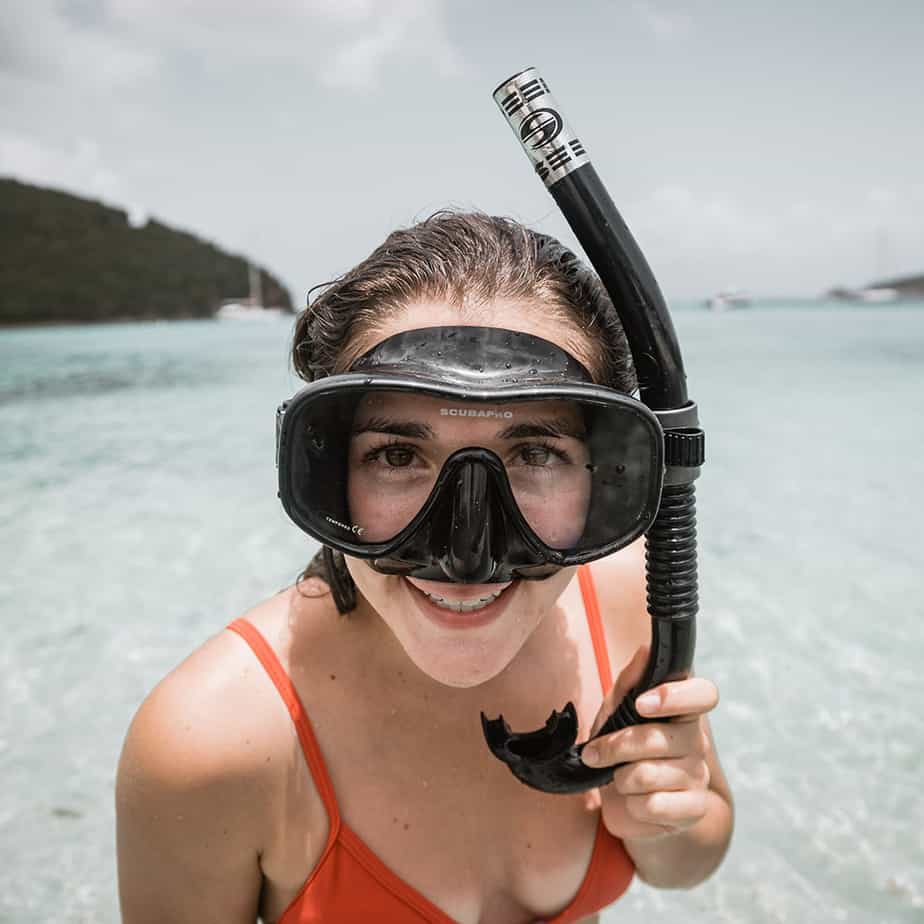
One of the most crucial steps for a snorkeler is to find a mask and snorkel that fits. If water keeps seeping into the mask or the snorkel mouthpiece hurts your jaw, then you’ll find it impossible to enjoy snorkeling.
It’s here that you also decide whether you want to purchase your own mask and snorkel or if you are willing to just rent them each time you’re on holiday. Due to how different each person is physically and otherwise, masks and snorkels are not one-size-fits-all.
The best holiday resorts will provide a wide range of sizes for their rental equipment. However, there’s no guarantee they have the right size for you, or that it will feel comfortable. The only way to ensure that it fits well each time is to have your own gear.
It’s really easy to determine how well a mask fits. If water leaks in, it’s not a good fit. You can have a good idea if a mask fits even without wearing it underwater. Simply place the mask on your face, holding it in place with a finger. Do not put on the mask strap. Now continuously inhale and let go of the finger. If the mask remains on your face while you’re inhaling, that means it has an airtight seal and is probably a good fit for your face.
Beginners make the mistake of tightening the mask strap so much to try to get an airtight and watertight seal that the strap digs into their skin. That’s not a good fit either. The mask should be able to stay on your face even without the strap or even a finger holding it in place as long as you’re inhaling.
As for the snorkel, find one that is compatible with your mask. We recommend getting one with a splash guard so that less water can enter the tube. You want one that is easy for you to fully inhale and exhale with. Also make sure that the mouthpiece is the right size. If it’s too large or small, it will tire your jaw out quickly and maybe even cause pain. Find one that you can wear for the entire snorkeling session without much or any discomfort.
Test your gear out
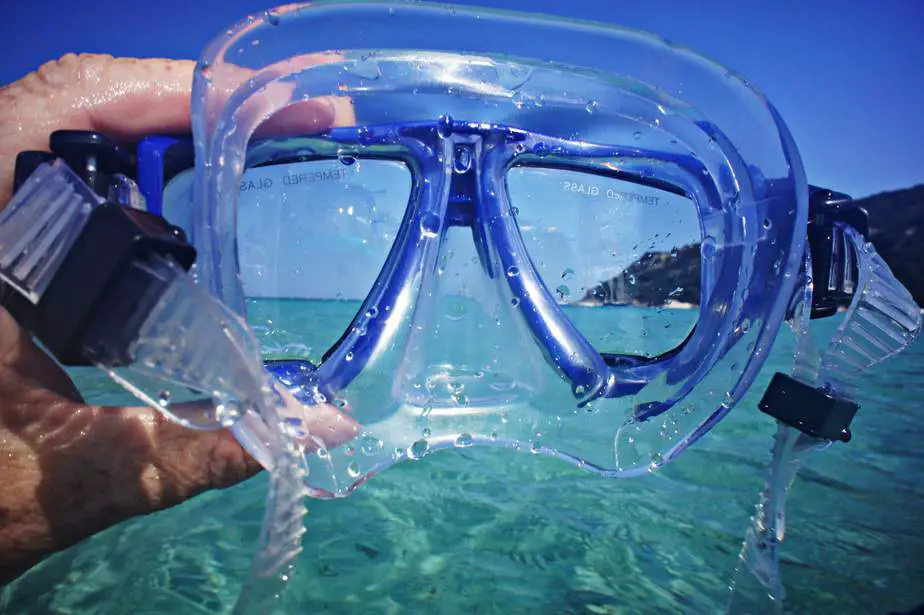
Nothing is worse than finding out that your snorkel gear has issues in the middle of your vacation. To prevent this, you should give your equipment a good try in a pool. Really test it out. Maybe issues don’t present themselves until after 15 minutes.
For instance, maybe you find that your mask fogs up a lot, or that the snorkel gets clogged easily or some other frustrating issue like that. In shallow water that you can stand up in, you will be in a safe space to figure out all your gear issues before attempting the real thing.
For the mask fogging issue, you may need to treat your dive mask before using it. Some people recommend scrubbing the lens with non-abrasive toothpaste. You can use a bottle of anti-fog and apply it each time before you head into the water. Some people even recommend burning off the thin layer of film that is present on the lens from manufacturing.
In a shallow pool, you can safely practice your snorkel finning techniques and practice your mask and snorkel clearing. Get really good at this, because you’ll be doing it a lot. Doing this work early on ensures that future snorkeling with your gear will be smooth.
Take deep breaths
The same advice is given to scuba divers: take long, deep breaths for best results. Granted, snorkelers and divers do it for slightly different reasons, however where they share the same benefits are that it helps them stay calm and ensures maximum airflow.
Inside your mouth, throat, lungs, and snorkel are sections of “dead air space.” This refers to air that hasn’t been fully expelled and renewed; you could call this stale air. This can slowly lead to a build-up in carbon dioxide (the waste product produced when you exhale) that can make it difficult to breathe.
Instead of getting a full breath of fresh air each inhale, you are actually inhaling some of that carbon dioxide back. Over time, you will start to feel dizzy and lightheaded due to insufficient oxygen. You are literally asphyxiating to death and can lose consciousness. If that happens, you really will lose your life, so surface your head and get a breath of fresh air ASAP!
This is also partially the reason why long snorkels are not practical. Other than the fact that inhaling becomes extremely difficult, the long tube would be filled with dead air space that would lead to asphyxiation.
Shallow breaths will cause carbon dioxide buildup to occur. Long, deep breaths are less likely to. Take deep breaths when snorkeling.
Use a flotation device
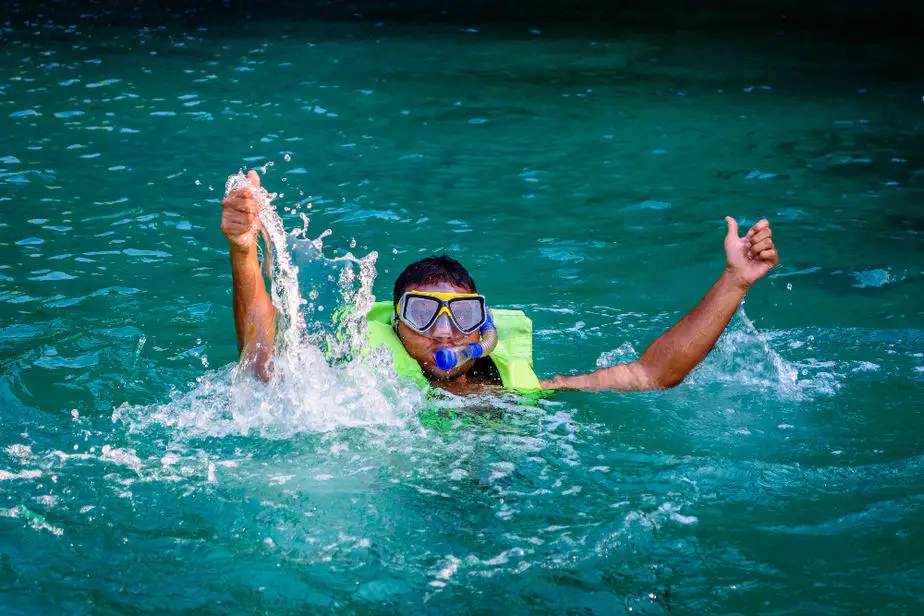
Using some kind of buoyancy aid such as a snorkel vest will help not only keep you safe, but help you conserve your energy. A snorkel vest is an inflatable vest that you can partially inflate or fully inflate depending on what you need. You can even fully deflate it when you want to dive, but then you’ll need to re-inflate it after to help you stay afloat.
Confident snorkelers who want to dive down can deflate their snorkel vest and duck dive to get a closer view of something. They can inflate it when they are back on the surface by blowing into the inflator tube which will fill the air bladder until the snorkeler is buoyant again.
Some other flotation devices are swimming floats, life jackets, flotation belts, and even a snorkel board. There’s nothing wrong with relying on a flotation device; even advanced snorkelers use it to conserve energy and snorkel for longer.
Tilt your head up when snorkeling
For a traditional mask and snorkel, when you are floating on your stomach with your face submerged, you actually want to tilt your head until it’s at a 45 degree angle. Basically, you want your eyes to be staring slightly ahead at the seafloor and not directly downwards.
If you look at how your snorkel is angled, you’ll realize that keeping your head tilted in this position will allow the snorkel to be pointed straight up. Any other angle will cause water to more easily enter the snorkel and cause choking.
Never snorkel alone
Once again we are taking a page from scuba diving, which is that you should stick close to a buddy when you’re out in the water. You never know when something might happen, be it a medical emergency, loss of consciousness, or a current sweeping you far away.
Snorkeling with a buddy is for peace of mind and safety. If something should happen, either to you or your buddy, then there is at least one person close by who can attempt a rescue or call for help.
If you’re diving with a group, then make sure to stay near them and the boat. We recommend staying with the guide who will show you the scenic path to all the cool locations. Snorkelers who go off and do their own thing might accidentally get left behind.
Plus, let’s stop talking all doom and gloom for a second and remind you that doing things with a group, buddy or family member is just more fun. You get a shared experience that you can enhance with each other’s company and can reminisce about it later on. Friends don’t let friends snorkel alone, so grab your mask, snorkel and fins and join your friend!
Swim into the current to start
This might sound counterintuitive, but if you start your snorkeling session off swimming into the current, then when it’s time to return the current will carry you back. It doesn’t make sense the other way around; you’ll be too tired to return after a long snorkeling session if you have to swim against the current.
Ideally, your snorkeling location will have little to no currents so you don’t have to worry about this. If you have a boat to come pick you up, then it doesn’t really matter what you do.
Pay attention to your surroundings
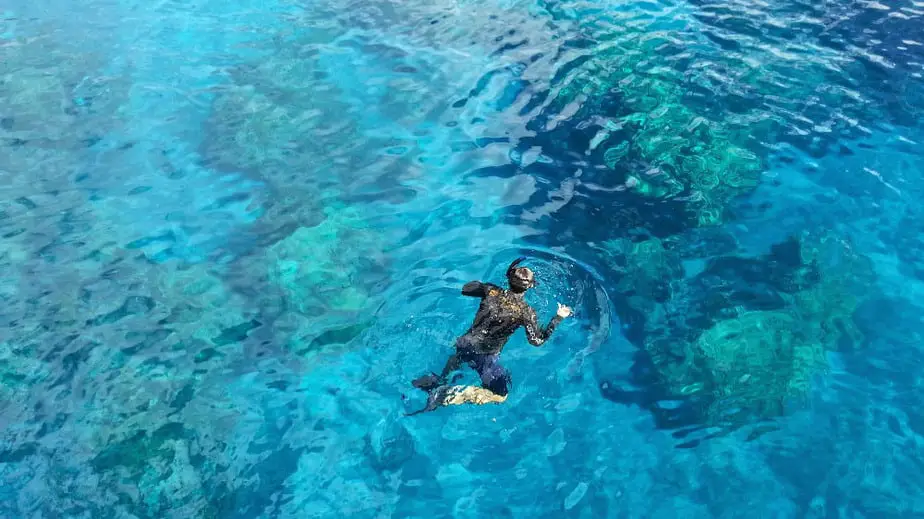
Situational awareness is an important skill to practice when snorkeling. Pay attention to what’s happening around you, such as your snorkeling buddy’s location, the weather condition, or the presence of any dangerous marine life.
The aquatic life generally doesn’t attack humans unless we get too close or harass them in any way. You should always keep a few meters distance from any sea creature that you see. Keep your hands off of them and don’t try to goad them into a better position if you’re trying to take photos while snorkeling.
Also, weather conditions can change. Waves or swell can carry you away or push you into a reef or rocks if you’re not paying attention.
Periodically look around you. Take note of how far you’ve gone and how much longer you plan on staying. Perhaps you should be heading back soon.
Duck dive one at a time
Lastly, if you and your dive buddy plan on duck diving, then take turns doing it. We’re not going to cover how to duck dive in this article; you can learn about it in a formal course or by asking a guide on a trip.
Anyways, it’s a good idea for at least one person to stay at the surface on lookout. In case something happens to the diver, the lookout can call for help or try to assist. When both snorkelers are underwater and something happens, then the situation can turn deadly.
Both freedivers and duck divers are worried about something called shallow water blackout. This phenomenon is aptly named because sometimes a diver will blackout in shallow waters when they are about to reach the surface. If no one is around to notice this, then that diver will drown.
So when skin diving or freediving, make sure at least one buddy is on standby at the surface as a precaution.
Parting words
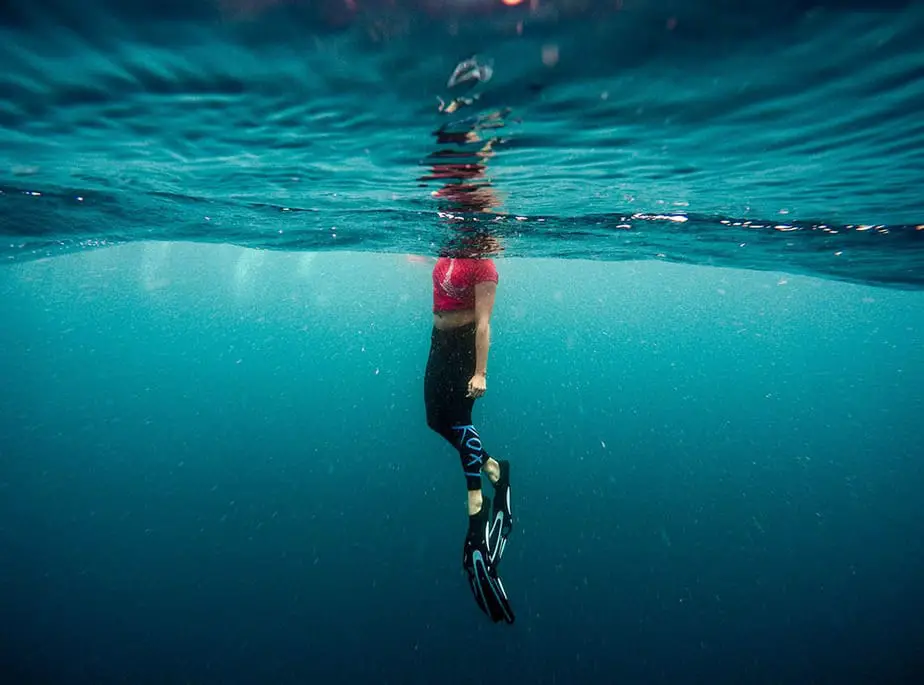
Despite this article running somewhat long, the information we provided is honestly not that difficult to learn if you already have experience with swimming. Is snorkeling hard? Generally not, unless you are a non-swimmer. Then your first goal should be to improve your swimming skills.
Snorkeling is relatively straightforward if you are just doing it recreationally. All you need are a mask, snorkel, fins, and a snorkel vest to get started. These are all relatively cheap to purchase, especially when compared to scuba diving equipment. You also do not need a certification to buy snorkeling equipment or to snorkel.
The barrier of entry to snorkeling is low. It’s a bit higher if you’re a non-swimmer. Arguably the flotation device can make up for lack of swimming ability, though we still recommend all snorkelers be confident in their swimming ability.
Instead of spending all of your time on holiday under an umbrella, why not actually head out into the water and experience the fantastic underwater world up close? With some caution and sense, anyone can enjoy snorkeling. Start off slow in shallow waters, test your gear out, dive with a buddy, and soon you’ll be off exploring like a pro.

